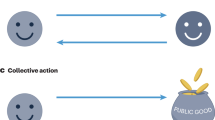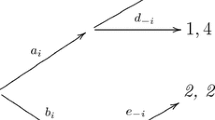Abstract
Cooperation can evolve in the context of cognitive activities such as perception, attention, memory, and decision making, in addition to physical activities such as hunting, gathering, warfare, and childcare. The social insects are well known to cooperate on both physical and cognitive tasks, but the idea of cognitive cooperation in humans has not received widespread attention or systematic study. The traditional psychological literature often gives the impression that groups are dysfunctional cognitive units, while evolutionary psychologists have so far studied cognition primarily at the individual level. We present two experiments that demonstrate the superiority of thinking in groups, but only for tasks that are sufficiently challenging to exceed the capacity of individuals. One of the experiments is in a brain-storming format, where advantages of real groups over nominal groups have been notoriously difficult to demonstrate. Cognitive cooperation might often operate beneath conscious awareness and take place without the need for overt training, as evolutionary psychologists have stressed for individual-level cognitive adaptations. In general, cognitive cooperation should be a central subject in human evolutionary psychology, as it already is in the study of the social insects.
Similar content being viewed by others
References
Aldag, R. J., and S. R. Fuller 1993 Beyond Fiasco: A Reappraisal of the Groupthink Phenomenon and a New Model of Group Decision Processes. Psychological Bulletin 113:533–552.
Barkow, J. H., L. Cosmides, and J. Tooby, eds. 1992 The Adapted Mind: Evolutionary Psychology and the Generation of Culture. Oxford: Oxford University Press.
Boehm, C. 1996 Emergency Decisions, Cultural Selection Mechanics and Group Selection. Current Anthropology 37:763–793.
Bonabeau, E., M. Dorigo, and G. Theraulaz 2000 Inspiration for Optimization from Social Insect Behavior. Nature 406:39–42.
Brown, V. R., and P. B. Paulus 2002 Making Group Brainstorming More Effective: Recommendations from an Associative Memory Perspective. Current Directions in Psychological Science 11:208–212.
Camazine, S., J.-L. Deneubourg, N. R. Franks, J. Sneyd, G. Theraulaz, and E. Bonabeau 2001 Self-organization in Biological Systems. Princeton: Princeton University Press.
Cosmides, L., and J. Tooby 1992 Cognitive Adaptations for Social Exchange. In The Adapted Mind, J. Barkow, L. Cosmides, and J. Tooby, eds. Pp. 163–225. New York: Academic Press.
Dugatkin, L. A. 1997 Cooperation among Animals. Oxford: Oxford University Press.
Gigerenzer, G., and U. Hoffrage 1995 How to Improve Bayesian Reasoning without Instruction. Psychological Review 102:684–704.
Gigerenzer, G., P. M. Todd, and A. R. Group 1999 Simple Heuristics That Make Us Smart. Oxford: Oxford University Press.
Hill, G. W. 1982 Group versus Individual Performance: Are N+1 Heads Better Than One? Psychological Bulletin 91:517–539.
Hutchins, E. 1995 Cognition in the Wild. Cambridge, Massachusetts: MIT Press.
Janis, I. L. 1972 Victims of Groupthink. Boston: Houghton Mifflin.
1982 Groupthink, second ed. Boston: Houghton Mifflin.
Michaelsen, L. K., W. E. Watson, and R. H. Black 1989 A Realistic Test of Individual versus Group Consensus Decision Making. Journal of Applied Psychology 74:834–839.
Michaelsen, L. K., W. E. Watson, A. Schwartzkopf, and R. H. Black 1992 Group Decision Making: How You Frame the Question Determines What You Find. Journal of Applied Psychology 77:106–108.
Mullen, B., C. Johnson, and E. Salas 1991 Productivity Loss in Brainstorming Groups: A Meta-analytic Integration. Basic and Applied Social Psychology 12:3–24.
Osborne, A. F. 1957 Applied Imagination. New York: Scribners.
Seeley, T. 1995 The Wisdom of the Hive. Cambridge: Harvard University Press.
Seeley, T., and S. C. Buhrman 1999 Group Decision Making in Swarms of Honey Bees. Behavioral Ecology and Sociobiology 45:19–31.
Sober, E., and D. S. Wilson 1998 Unto Others: The Evolution and Psychology of Unselfish Behavior. Cambridge: Harvard University Press.
Stroebe, W., and M. Diehl 1994 Why Groups Are less Effective Than Their Members: On Productivity Losses in Idea-Generating Groups. European Review of Social Psychology 5:271–303.
Taylor, D. W., and W. I. Faust 1952 Twenty Questions: Efficiency in Problem Solving as a Function of Size of Group. Journal of Experimental Psychology 44:360–368.
Timmel, J. J. 2001 Group Cognition from a Multilevel Evolutionary Perspective. Ph.D. dissertation, Binghamton University.
Tindale, R. S., and J. R. J. Larson 1992a Assembly Bonus Effect or Typical Group Performance? A Comment on Michaelsen, Watson and Black (1989). Journal of Applied Psychology 77:102–105.
1992b It’s Not How You Frame the Question, It’s How You Interpret the Results. Journal of Applied Psychology 77:109–110.
Watson, W., L. K. Michaelsen, and W. Sharp 1991 Member Competence, Group Interaction, and Group Decision Making: A Longitudinal Study. Journal of Applied Psychology 76:803–809.
Wegner, D. M. 1986 Transactive Memory: A Contemporary Analysis of the Group Mind. In Theo- ries of Group Behavior, B. Mullen and G. R. Goethals, eds. Pp. 185–208. New York: Springer-Verlag.
Wegner, D. M., R. Erber, and P. Raymond 1991 Transactive Memory in Close Relationships. Journal of Personality and Social Psychology 61:923–929.
Wilson, D. S. 1997 Incorporating Group Selection into the Adaptationist Program: A Case Study Involving Human Decision Making. In Evolutionary Social Psychology, J. Simpson and D. Kendricks, eds. Pp. 345–386. Mahwah, New Jersey: Erlbaum.
Wilson, D. S., C. Wilczynski, A. Wells, and L. Weiser 2000 Gossip and Other Aspects of Language as Group-Level Adaptations. In Cognition and Evolution, C. Heyes and L. Huber, eds. Pp. 347–365. Cambridge, Massachusetts: MIT Press.
Author information
Authors and Affiliations
Corresponding author
Additional information
David Sloan Wilson is an evolutionary biologist interested in a broad range of issues relevant to human behavior. He has published in psychology, anthropology, and philosophy journals in addition to his mainstream biological research. He is author of Darwin’s Cathedral: Evolution, Religion, and the Nature of Society (University of Chicago Press, 2002) and co-author with philosopher Elliott Sober of Unto Others: The Evolution and Psychology of Unselfish Behavior (Harvard University Press, 1998).
John J. Timmel received his Ph.D. from Binghamton University in 2001.
Ralph R. Miller is Distinguished Professor of Psychology at Binghamton University. His research interests include information processing in animals, with an emphasis on elementary, evolutionarily derived, fundamentals of learning and memory that might be expected to generalize across species, including humans.
Rights and permissions
About this article
Cite this article
Wilson, D.S., Timmel, J.J. & Miller, R.R. Cognitive cooperation. Hum Nat 15, 225–250 (2004). https://doi.org/10.1007/s12110-004-1007-7
Received:
Revised:
Issue Date:
DOI: https://doi.org/10.1007/s12110-004-1007-7




